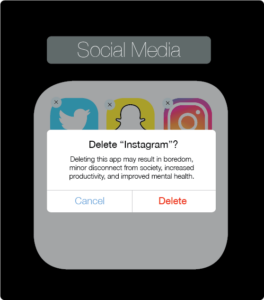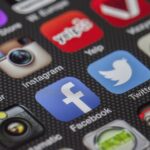Social Media and Depression: How are they linked?
Social media has almost become like a window into our daily lives, so researchers have been trying to investigate if social media activity can help identify depression.
- A research conducted in 2021 suggests that reduced social media activity may be an indication of depression, However more research is required to validate the findings of this study before drawing a conclusion.
- Researchers have also tried to study if facebook posts can be used to find loneliness or depression and the findings are really interesting. The study found that both depressed and lonely people were more likely to use language about sickness, pain, and negative emotions, including words like “crappy,” “miserable,” and “tired”.
Deleting Social Media: Reasons beyond Depression
Although we have been discussing the link between deleting social media and depression, it is important to acknowledge that people might be leaving social media for several other reasons as well. Reducing social media intake can lead to increased productivity, better time management, other mental health benefits such as reduced social comparison, improved sleep, etc.
You might be wondering, if social media activity cannot be the only marker for depression, what are some signs that we can look for?
Here are a few signs or symptoms that might indicate depression
- Feeling low or lack of energy through the day for extended period of time
- Feeling a lack of interest in activities that are usually enjoyable
- Sleeping too less or sleeping too much than what you usually require.
- Consistent feelings of sadness, worthlessness for an extended period of time
- Feelings of irritability and hopelessness
- Indulging in alcohol or drug intake or increased alcohol intake
Digital Detox: Is taking a break from social media the way to go?

You might be wondering, if increased or excessive social media contributes to mental health issues, would it help if we were to take a break from it? And the answer to it is a solid ‘Yes’
- When a group of undergraduate students was asked to limit their social media usage to 30 minutes per day for three weeks, they reported significant reduction in their feelings of loneliness and anxiety.
- A recent study conducted in Swansea University shows similar findings. When participants reduced their social media use by 15 minutes a day, they had an improvement in their overall health and also reduced levels of loneliness and depression.
- Even a 7 day short break from social media can have a positive impact on symptoms of anxiety and depression. In addition to this, other research findings indicate that limiting social media use leads to improvement in sleep cycles as well.
Conclusion
There is no conclusive evidence to suggest that deleting social media is a sign of depression but social media does have a strong impact on mental health. If you notice, most of the research advocates towards limiting social media to avoid any harmful side effects on mental health.
References
- Choudhury, M. D., Gamon, M., Counts, S., & Horvitz, E. (2013). Predicting Depression via Social Media. Proceedings of the International AAAI Conference on Web and Social Media, 7(1), Article 1. https://doi.org/10.1609/icwsm.v7i1.14432
- Handley, E. (2022, May 6). Seven-day social media break can reduce depression and anxiety. Open Access Government. https://www.openaccessgovernment.org/seven-day-social-media-break-can-reduce-depression-and-anxiety/135128/
- Hunt, M. G., Marx, R., Lipson, C., & Young, J. (2018). No More FOMO: Limiting Social Media Decreases Loneliness and Depression. Journal of Social and Clinical Psychology, 37(10), 751–768. https://doi.org/10.1521/jscp.2018.37.10.751
- Tandon, A., Kaur, P., Dhir, A., & Mäntymäki, M. (2020). Sleepless due to social media? Investigating problematic sleep due to social media and social media sleep hygiene. Computers in Human Behavior, 113, 106487. https://doi.org/10.1016/j.chb.2020.106487
- Turel, O., Cavagnaro, D. R., & Meshi, D. (2018). Short abstinence from online social networking sites reduces perceived stress, especially in excessive users. Psychiatry Research, 270, 947–953. https://doi.org/10.1016/j.psychres.2018.11.017
- Piteo, E. M., & Ward, K. (2020). Review: Social networking sites and associations with depressive and anxiety symptoms in children and adolescents – a systematic review. Child and Adolescent Mental Health, 25(4), 201–216. https://doi.org/10.1111/camh.12373
- O’Connor, E. A., Whitlock, E. P., Gaynes, B., & Beil, T. L. (2009, December). Table 1, Primary DSM-IV depression disorders, criteria for adults [Text]. Agency for Healthcare Research and Quality (US). https://www.ncbi.nlm.nih.gov/books/NBK36406/table/ch1.t1/
- The language of loneliness and depression, revealed in social media. (2022, October 26). Penn Today. https://penntoday.upenn.edu/news/Penn-research-language-of-loneliness-depression-on-social-media

